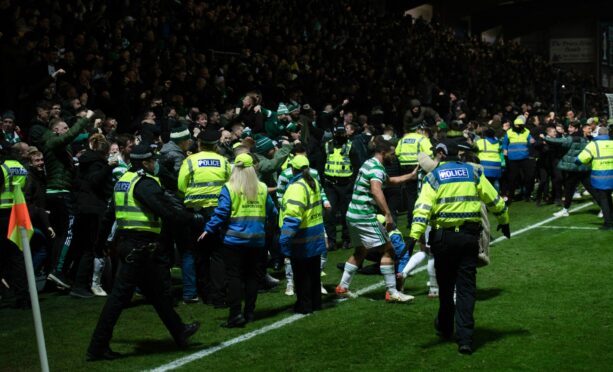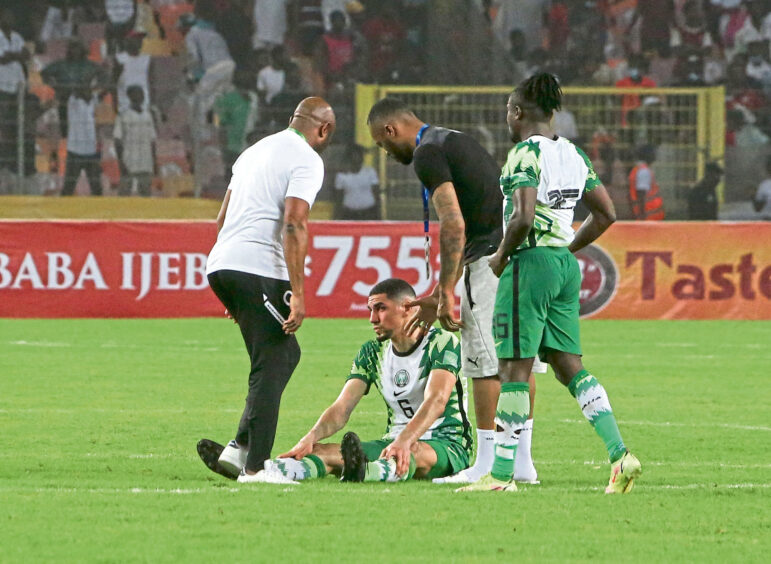
The authorities, inside and outside football, could be forgiven for mouthing a silent prayer for good behaviour when a frantic run of Premiership derby action kicks off with today’s Old Firm clash at Ibrox.
The showdown has the potential to be an encounter for the ages, with Celtic and Rangers locked in a gripping race for the title.
Then on Saturday, Hearts take on Hibs at Tynecastle and Dundee make the shortest of trips to Tannadice for the City of Discovery festivities against United.
And just a week later, the Glasgow and Edinburgh rivals do it all again, when they meet in the Scottish Cup semi-finals at Hampden.
Since Covid first wreaked havoc on society two years ago, we have seen such occasions played out against a backdrop of empty stadiums.
Now the fans are back, often in huge numbers. But it hasn’t required full houses for a worrying trend of fan misbehaviour to gather pace.
At the start of the season, dozens of Aberdeen fans in the 1,710 crowd invaded the Almondvale pitch after their side has scored a late winner against Livingston.
In December, Celtic fans amongst the 5,592 members of the audience were also where they shouldn’t have been in Dingwall after Anthony Ralston’s 97th-minute goal defeated Ross County.
Then only last Saturday, just 1,650 fans watched Airdrie draw with Cove Rangers in League One.
Yet after the game, the Diamonds were compelled to appeal for witnesses after an incident outside the Penny Cars Stadium, adding they had been left “disgusted” by the alleged assault on an elderly man and other Cove supporters.
The Highland League, meanwhile, felt compelled to issue a message that racism in football was unacceptable following successive incidents.
An 84-year-old man was charged in connection an alleged hate crime at a match between Keith and Huntly.
Nairn County also launched an investigation into allegations a Huntly player was racially abused in a game against them.
So while it’s largely been great to have the fans back this season, their return has not been the widespread celebration that was expected.
Rangers supporters may be delighted to have two cracks at Celtic over the next fortnight that have the potential to help their club take major strides towards claiming the Premiership and Scottish Cup double.
They were, however, roundly furious at news of plans to meet their rivals in the Sydney Super Cup later this year, and made their feelings clear in no uncertain terms.
The row had an impact on the pitch, quite literally, with the game against Dundee at Dens Park halted on three separate occasions when barrages of toilet rolls and tennis balls were thrown onto the playing surface.
The “Bar-B Derby” has now been scrapped, and Rangers have put that down to failings by the tournament organisers, something they dispute.
While defending the right of supporters to take issue with the plans, Rangers boss Giovanni van Bronckhorst had urged them to temper their protests.
He had his boots back on in front of around 40,000 in last Saturday’s Legends game at Ibrox.
There was a carnival atmosphere, but the sight of a number of kids entering the pitch at full-time, looking for selfies and autographs, flew in the face of the club’s warning against such behaviour following similar instances after the Europa League tie with Borussia Dortmund.
There have been plenty of other examples of fan misbehaviour.
England manager Gareth Southgate hit out at the booing of Harry Maguire during last Tuesday’s friendly against Ivory Coast.
His team had already been ordered by UEFA to play two Nations League fixtures behind closed doors in June as punishment for fan unrest at the Final of Euro 2020 against Italy.
Last week’s World Cup Play-offs, meanwhile, were hit by some serious trouble.
The Egyptian FA complained Mo Salah and his team-mates had bottles and rocks thrown at them by Senegal fans as they warmed up, and that their team bus was attacked as it entered their opponents’ stadium.
Nigeria supporters, meanwhile, stormed the pitch, tore down dugouts and clashed with police after the country – with Rangers trio Leon Balogun, Calvin Bassey and Joe Aribo in their ranks – failed to get through their tie against Ghana.
All of that pales into insignificance compared to the appalling violence at a league game between Mexican teams Queretaro and Atlas last month that left 17 dead, and many more injured.
If there is plenty of reason to be thankful such scenes are not witnessed here, there is not any room for complacency.
Fans going on the pitch at the end of a game, for example, is not right but can be largely harmless – until one invader intent on violence makes things turn ugly.
As much as the upcoming derbies, with all their great rivalry, offer some of the best entertainment the Scottish game has to offer, so they also have the greatest potential to get overheated – off and on the pitch.
They need to be occasions that can be enjoyed safely by all – players, fans and officials.
To make sure that happens requires a collective effort, and not just from those in charge. Self-policing in the stands is essential, too.

Enjoy the convenience of having The Sunday Post delivered as a digital ePaper straight to your smartphone, tablet or computer.
Subscribe for only £5.49 a month and enjoy all the benefits of the printed paper as a digital replica.
Subscribe